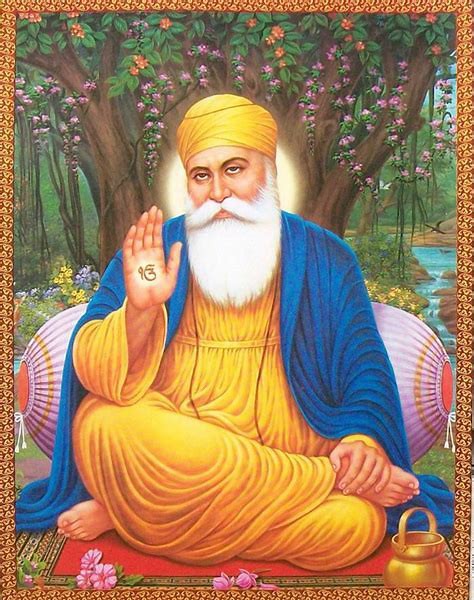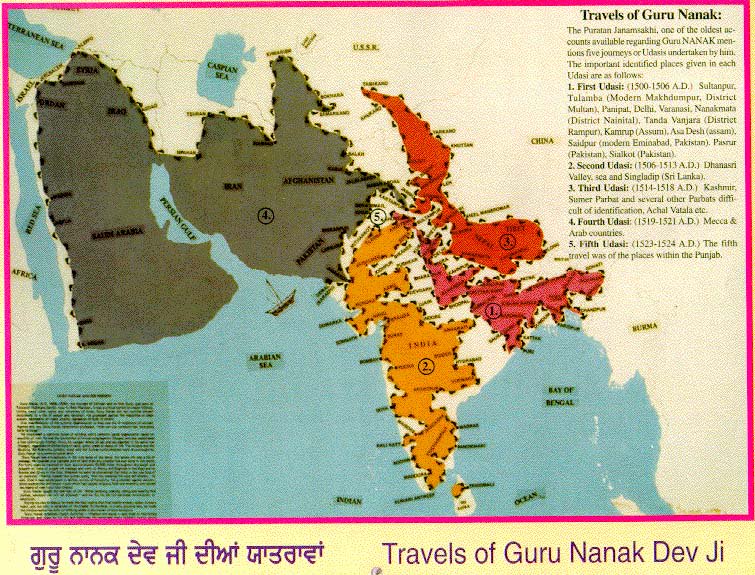Guru Nanak Dev Ji
Guru Nanak Dev Ji
” ਜਿਉ ਕਰ ਸੂਰਜ ਨਿਕਲਿਆ । ਮਿਟ ਧੁੰਦ ਜਗ ਚਾਨਣ ਹੋਆ ॥ “
Introduction : –

Guru Nanak Dev Ji, founder of the Sikh religion and the first of a succession of ten Gurus, was born on April 15, 1469. He was born at Rai Bhoi Ki Talwandi, now called Nankana Sahib, 65 km south west of Lahore in Pakistan. His father, Mehta Kalian Das Bedi, more commonly known as Mehta Kalu, was a Bedi Khatri by caste and a patwari in the service of Rai Bular, a local Muslim Chief.
He was a precocious child who at the age of five asked questions about the purpose of life. At the age of seven he was sent to a pandit to learn the alphabet and two years later to the Maulvi – a Muslim teacher, to learn Persian and Arabic. He surprised his teacher by composing an acrostic poem with a deeply philosophical and mystic import. He was always absorbed in his thoughts.
Guru Nanak Dev Ji was married to Mata Sulakhni,the daughter of Mool Chand, Batala (district Gurdaspur). Guru Nanak Dev Ji had two sons – Srichand and Lakhmi Chand
Compositions : –
Guru ji composed 947 hymns, Japji Sahib , Asa-di-var, Bara Mah, Sidh-Gosht and Onkar and these were included in Guru Granth Sahib Ji.
Guru Nanak Dev Ji
Attained Enlightenment : –
One day, Guru Nanak went for bathing in the River Bein and went missing for three days and nights. His disappearance has been described as meeting with God who ordained him to preach his name. The first words Guru Ji uttered on reappearance were: “ There is no Hindu, there is no Musalman ”.
Contributions to humanity : –
Amid his opportunity on Earth Master Nanak was venerated by the two Hindus and Muslims and even today many, outside of the Sikh confidence, love him. It is connected that as he lay kicking the bucket, his adherents some time ago Hindu and others once in the past Muslims contended whether his body ought to be incinerated as Hindu custom managed or covered as in Islamic convention. It is said that when they evacuated the sheet which had secured the Master they discovered just wonderful blossoms. The Hindus consumed theirs, the Muslims covered theirs.
Following are highlighted contribution of Guru Nanak :
Equality of humans : –
 At the point when in the center east, the west and whatever is left of Asia subjection, class, and racial segregation was overflowing and regard between the diverse classes and standing was at a pinnacle, Master Nanak lectured against separation and biases because of race, rank, status, and so on.
At the point when in the center east, the west and whatever is left of Asia subjection, class, and racial segregation was overflowing and regard between the diverse classes and standing was at a pinnacle, Master Nanak lectured against separation and biases because of race, rank, status, and so on.
He stated: “See the fellowship of all humankind as the most astounding request of Yogis; vanquish your own brain, and overcome the world”. likewise “There is one mindfulness among all made creatures”. lastly “One who perceives the One Ruler among all creatures does not discuss the inner self.”. He encourages every one of the people groups of the world to “overcome” their brains to these insidious practices. Every person had the light of the Master and was the same – just by repressing one’s pride and self-image would one be able to see this light on the whole.
Equality of women : –
In around 1499 when the world offered low to no status or regard to ladies, Master Nanak looked to enhance the regard of ladies by spreading this message: “From lady, man is conceived; inside lady, man is imagined; to lady he is locked in and hitched. Lady turns into his companion; through the lady, the future ages come. At the point when his lady kicks the bucket, he looks for another lady; to the lady, he is bound. So why call her terrible? From her, rulers are conceived. From a lady, the lady is conceived; without the lady, there would be nobody by any stretch of the imagination. O Nanak, just the Genuine Ruler is without a lady”. In this manner, he advanced ladies’ rights and fairness — a first for the fifteenth century!
Spiritual Journeys : –
Guru Nanak Dev Ji made four awesome Spiritual adventures, setting out to all parts of India, Sri Lanka, Arabia and Persia. He visited head focuses everything being equal and had talks with head ministers of different groups of Hindus, Jains, Buddhists, Parsees, and Muslims. Wherever he result in Spiritual talks; subsequently having adherents from every single religious foundation.
He talked in the sanctuaries and mosques and at different journey destinations. Wherever he went, Guru Nanak stood in opposition to discharge religious ceremonies, journeys, the rank framework, the forfeit of dowagers, of relying upon books to take in the genuine religion, and of the various precepts that were to characterize his lessons. Never did he request that his audience members tail him. He requested that the Muslims be genuine Muslims and the Hindus to be genuine Hindus.
The Teachings of Guru Nanak Dev Ji : –
Guru Nanak founded and formalized the three pillars of Sikhism:
1. Naam Japna: Guru Nanak Dev ji said to Sikhs that they should have to do Simran and Naam japan in daily early morning
2. Kirat Karni: Guru Nanak Dev ji said to Sikhs that they should have to do work on daily basis.
3. Vand Chakna: Guru Nanak Dev ji said to Sikhs that they should have to share the 10% of salary between at Gurudwara Sahib.
others teachings :
1. Belief in one God
2. Hukam
3. Haumai
4. Nam Japna
5. The Guru
6. Nadar
7. Sewa
8. Casteless Society
| Birth | 1469 at Rai Bhoi Ki Talwandi ( now called Nankana Sahib ) |
| Father / Mother | Mehta Kalian Das Bedi / Mata Tripta Ji |
| Spouse | Bibi Sulakhni |
| Sons | Shri Chand and Lakhmi Das |
| Compositions | Japji Sahib, Asa di Vaar, Onkar, Sidh Gosht, Barah Mah, 947 Hymns |
| Attained Enlightenment | At the River Bein |
| City Founded | Kartarpur ( Pakistan ) |
| Introduced | Langar Pratha |
| Mughal Emperor at his time | Babur ( First Mugal Emperor ) and Sher Shah Suri |
| His Successor | Lehna ( Guru Angad Dev ji ) |
| Jyoti Jot | 1539 at Kartarpur |
Jyoti Jot : –
On September 7, 1539 Guru Nanak Dev ji departed the body , in the early hours of the morning, the time of the day he loved most and described as amrit – vela, the ambrosial hour. Guru Nanak Dev ji is still remembered as the King of holy men, the Guru of the Hindus and the Pir of the Musalmans.